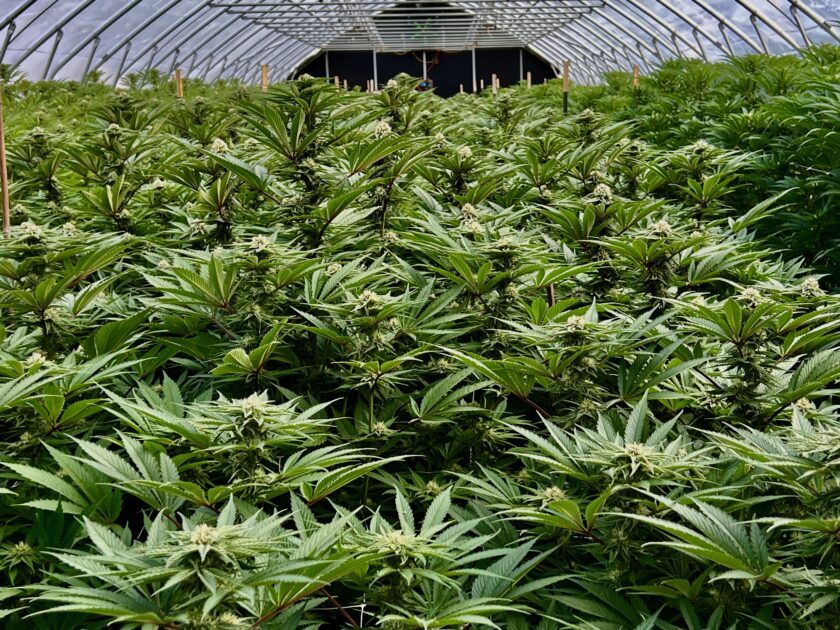


































































Marijuana grow operation, Northern California. Photo: Jeffrey St. Clair.
Unlike Frederick Engels, I have never owned a factory, but like Engels I have been and still am a Marxist. For decades, I was also a capitalist in the cannabis world and a criminal, too, in the Marxist definition of the word. In Theories of Surplus Value, Engels’ buddy Karl Marx writes that a criminal “breaks up the monotony of bourgeois life” and also a major producer of both use and exchange value in capitalist society. I exchanged weed for a car and a teepee which provided a home for a couple of years.
“A criminal,” Marx explains, “produces crimes, criminal law, the police, criminal justice, penal codes, arts, bell-letters, novels.” As a criminal in the cannabis world in California when I was in my 30s and 40s I wasn’t alone. There were tens if not hundreds of thousands of us in the 1970s, 1980s and 1990s, cultivating, harvesting, transporting, selling and consuming weed. I left the commercial industry at about the same time that California voters approved Proposition 215 which legalized medical marijuana in the Golden State.
Becoming a marijuana grower and trafficker certainly enlivened my own life, and, while I don’t take sole credit for producing crime, criminal law, cops and penal codes I played a small part in the big picture. Also, as a marijuana journalist and as writer of fiction and nonfiction as well as a creator of a feature film about marijuana I helped to produce the literature and the culture that reflected the industry and its workers.
I had read about capitalism in The Communist Manifesto and elsewhere before I entered the cannabis world but I had no direct experience as a capitalist until I grew and sold weed. From first hand experience, I learned about the rules of supply and demand, the fluctuations of the market, the role of the police in regulating the industry and in helping to set prices. Raids put a dent in the supply and jacked up prices. I also witnessed the vital role that marijuana dollars played in fueling the California economy when it needed fueling. Growers and dealers struck me as modern day pirates.
Ever since the early days of capitalism, crime and criminals helped with the “primitive accumulation of wealth.” Indeed, marijuana farmers and traffickers extended the story of primitive accumulation into the 20th century. Marx explained that “The discovery of gold and silver in America, the extirpation, enslavement and entombment in mines of the aboriginal population, the beginning of the conquest and looting of the East Indies, the turning of Africa into a warren for the commercial hunting of black-skins, signaled the rosy dawn of the era of capitalist production.”
True, capitalism had long existed in California and elsewhere before the cannabis industry came along, but cannabis boosted local economies, especially in Sonoma, Mendocino, Humboldt and Lake counties when the lumber and fishing industries failed, men and women were out of work, tax dollars dried up and when commerce in small towns and cities suffered. Marijuana revived towns like Garberville, Willits, Eureka, Arcata, Sebastopol and truck stops in-between. Vineyards, grapes and wine would follow in the wake of weed.
My father was the first commercial marijuana grower I knew. A bootlegger and a rum runner in the 1920s who delivered Prohibition booze to speakeasies, he belonged to the Communist Party in the 1930s and had a long lucrative career as a lawyer on Long Island during the real estate boom of the 1950s. While he called himself a Marxist he was more of an economist determinist. His favorite book was Charles Beard’s An Economic Interpretation of the Constitution, which is due for a reevaluation today as the nation celebrates its 250th birthday. The second commercial marijuana grower I knew came from a prosperous Marin County family and ran his operation like a corporation with employees, wages and bonuses and armed guards to protect against thieves. If only hippies had been growing it I would probably not have been interested. My dad was growing marijuana he told me, because his monthly social security check and his savings didn’t cover basic expenses.
I didn’t know about his crop until he was dying of cancer. A month or so before his death, a day before his 67th birthday, he called me to his bedside, told me his secret and made me promise not to share it with my mother or anyone else. When he died before his crop had gone the distance and reached maturity I harvested it, cured it and transported it to an apartment in Santa Rosa in a working class Mexican neighborhood where I was living and writing. Every morning for several months I rolled half a dozen or so joints, smoked them, got stoned and worked on a book with my by-line which was published in 1980 under the title My Search For Traven. I would write other books aided and abetted by marijuana.
The smell of marijuana leaked out of my Santa Rosa apartment, so much so that a neighbor knocked on my door and asked me to sell him weed. That was my first deal. He handed me cash and I forked over a baggie. I transported weed on a flight to New York in a suitcase. In a rented vehicle I drove pounds to Los Angeles where I sold them at $4,000 a pound to my friend Mark Rosenberg who I knew from our days in SDS together and who was then the president of Warner Brothers pictures. Mark gifted ounces as end-of-the-year bonuses to men and women who’d worked on movies he produced such as The Fabulous Baker Boys. I sold the idea of a marijuana movie titled Homegrownwhich was produced in 1996, soon after California approved of medical marijuana. I also wrote articles and stories about weed for High Times magazine under the alias Joe Delicate. High Times also published my book, Marijuanaland: Dispatches from an American War which was also published in France under the same title. “Everyone in France knows the word marijuana,” my translator told me. Around the world, it’s known as marijuana, though it’s also known as ganja, grass, cannabis, dagga and more.
Yes, I was growing it at the same time I was writing about it, and from 1981 until the end of the decade I was a grower and an instructor in the English Department at Sonoma State University, paid about $6,000 a semester – not enough to live on.
After growing for a couple of years in Sonoma County and after tense helicopter surveillance, I grew in Mendocino east of Willits on a mountain top where 75 or so families also grew marijuana. On Main Street in Willits I saw marijuana dollars change hands as growers bought cars and trucks, groceries and gifts at Christmas for the kids. Hypocrisy ruled. Local business folks took the pot money with both hands and insisted there was no marijuana money in Mendocino. “Go to Oregon if you want that story,” a head of the Willits chamber of commerce told me.
I grew during Reagan’s presidency and during the war on drugs, which was really a war on people, when civil rights were violated, and also when greed often ruled on pot farms. My friend Ray Raphael, a Humboldt County teacher, tells the story of how hippies became capitalists in Cash Crop: An American Dream. Indeed, weed was and still is as American as apple pie and mom; a countercultural sacrament that was embraced by agriculture and became an industry.
Michelle Alexander tells the harrowing story of how weed laws and the enforcement of weed laws led to the persecution of young men of color in her landmark book, The New Jim Crow: Mass Incarceration in the Age of Colorblindness. In Northern California white men and women were also arrested and incarcerated. In big cities people of color were the big target of law enforcement as they are also the main targets of ICE today. It ain’t fair and it’s crying shame.
My experiences in the weed world provided me with a real education in economics and politics. I got out of the biz when I was awarded a Fulbright Fellowship to teach American literature in Belgium where I didn’t know a single dealer. When I came home I was hired to teach fulltime and with a pension at Sonoma State University. For a decade I had worried that I’d be arrested and lose my part-time teaching job. Fortunately, I was able to lead three lives as a marijuana grower, a college teacher and as a pot reporter.
After I gave up growing commercially, I continued to grow a modest crop for my own personal use. I even grew it in my backyard at Ocean Beach in San Francisco, but the cold, the fog and the wind didn’t favor marijuana cultivation. I use a salve today that combines THC and CBD and helps with arthritis. I’m happy it’s legal, happy there aren’t the kinds of mass arrests there once were, still distressed that the White House and war drug warriors lied to the American public about the danger of a flower that humans have relied on for their health and for spiritual harmony for thousands of years.
Did Marx and Engels smoke weed? Probably not. But they might have. After all Marx said “Nothing human is alien to me” and weed has rarely been alien to humans, from ancient China and ancient Egypt to Chile and California today.
The post I Led Three Lives: College teacher, Pot Grower and Marijuana Journalist appeared first on CounterPunch.org.
This post was originally published on CounterPunch.org.